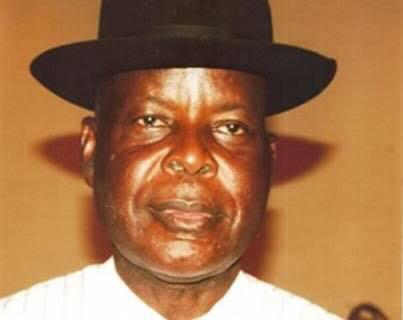A former Inspector-General of Police, Sir Mike Mbama Okiro on Wednesday revealed that poor funding is the biggest major challenge of the Nigeria Police Force, and one of the reasons crimes and corruption are on a steady increase in Nigeria.
 Okiro made this known during a radio program, PUBLIC CONSCIENCE produced by the Progressive Impact Organization for Community Development, PRIMORG, in Abuja.
Okiro made this known during a radio program, PUBLIC CONSCIENCE produced by the Progressive Impact Organization for Community Development, PRIMORG, in Abuja.
He was reacting to an investigation by Daily Trust Newspapers which exposed that some police divisions received only N10, 000 monthly to run their operation. Which meant Police stations in the country now depend on the money raised from unlawful acts such as bail fees, bribes, and extortion to ‘raise’ money for their day-to-day activities.
The former Police chief who served between 2007–2009, disclosed that the Police under him also struggled with low budgetary allocation from the Federal Government, and noted that only 50 to 60 percent of the police budget is usually implemented which limited their productivity.
He argued that poor funding much more affected the output of Nigerian Police than issues of poor management and corruption.
“When I was the Inspect General of the Police, I was forced to give money down to the division. I donated and distributed money to all the divisions, and how much was it; ten thousand per quarter, to enable them to do certain things for themselves but that is not enough.
“If there is a robbery, you tell the police to come and there is no vehicle, even if there is a vehicle there is no fuel for the vehicle. You don’t expect the policeman to trek covering meters to go and confront armed robbers.
“As a CP in Lagos, I was having three hundred and sixty thousand nairas as a quarter fund to buy a vehicle. Can three hundred and sixty thousand nairas buy and cater for a vehicle? It is not an issue of corruption, you can only corrupt what you get when there is no money where you will get to steal,” Okiro stated.
He backed the planned decentralization of the police to enable zones to receive their funds directly and distribute them to divisions under them while warning the government of the dangers of poor funding of police in the country.
“Police is the lead agency in our internal security. Technically and logically if our police are not effective, our internal security will be in shambles and that’s what we are getting now. No funding, no manpower in a country where we have millions of youths roaming the streets without employment going into crime becomes easy and yet the police do not have enough manpower to do their jobs,” Okiro said.
 Similarly, General Editor at Daily Trust Newspapers, Hamza Idris stated that poor funding of the Force is largely responsible for the corruption associated with policemen at police stations.
Similarly, General Editor at Daily Trust Newspapers, Hamza Idris stated that poor funding of the Force is largely responsible for the corruption associated with policemen at police stations.
He revealed that the idea behind the investigation is the prevailing security situation in the county, hence the media house decided to look at the systemic problems facing the Police in Nigeria.
According to Idris, with a strong and viable police force, the nation would not have had numerous security outfits, and soldiers hardly are seen on the streets. While emphasizing the need to salvage the Nigerian Police by making more funds available and exploiting technology in policing.
On his part, the Head of Judiciary Desk at Daily Trust Newspapers, John Azu identified accountability as a major problem militating against proper utilization of funds approved for the Nigerian Police Force.
According to him, besides the challenge of underfunding, the Nigerian police are also faced with issues of corruption, integrity, or lack of moral status by some personnel.
His words: “It is not a mystery whether corruption is directly linked to what is going on in our police stations. Naturally, humans have this tendency to acquire more, so the police are part of society.
“There is a mystery in the aspect of the utilization of some of the support police gets, especially in logistics. Annually state governments and organizations donate vehicles, equipment to the police which nobody gets to know the whereabouts of those facilities and vehicles.

“I think that there is this detachment from the police, even among the personnel, accountability is an issue, and then lack of interest.
“Maybe it’s a question of morale going down among the officers and men of the Force,” Azu stated.
Public Conscience is a syndicated weekly anti-corruption radio program used by PRIMORG to draw government and citizens’ attention to
Corruption and integrity issues in Nigeria.
About Author
You may also like
-
SGBV: Activists Seek Stringent, Stiffer Penalties For Rape Offenders
-
Anti-Corruption: Whistleblowing Law Long Overdue – Activists, Lawyers Counsel FG
-
N12bn Bribery Scandal: EFCC Urged To Prosecute Indicted Nigeria Customs Officials
-
NEIP: ICPC Harps On Collective Fight Against Corruption
-
ICPC Says Constituency Projects Tracking Declining Corruption, Urge Nigerians To Report Infractions
